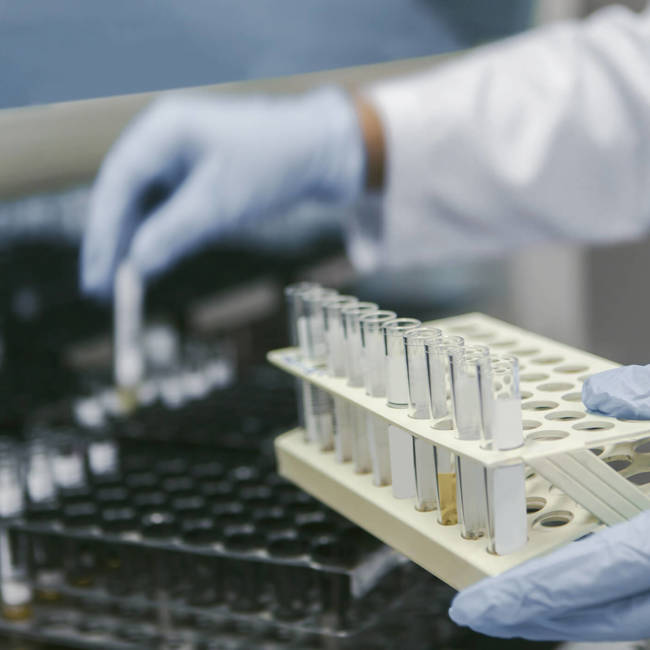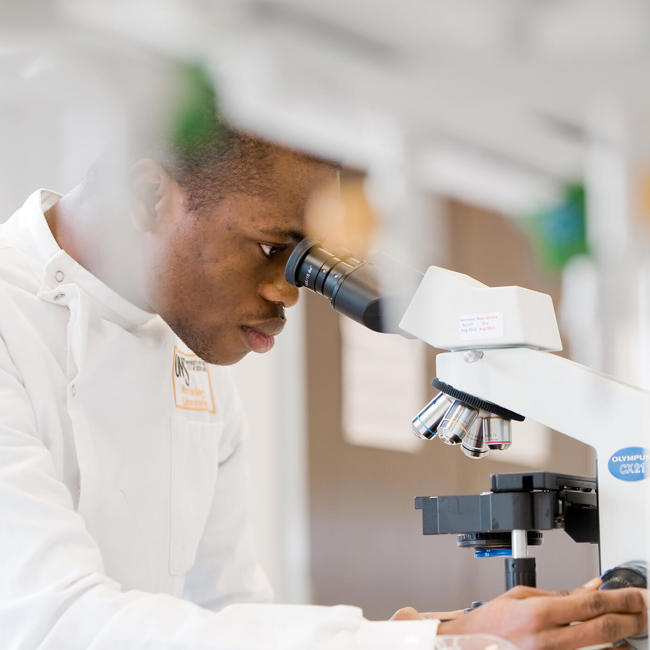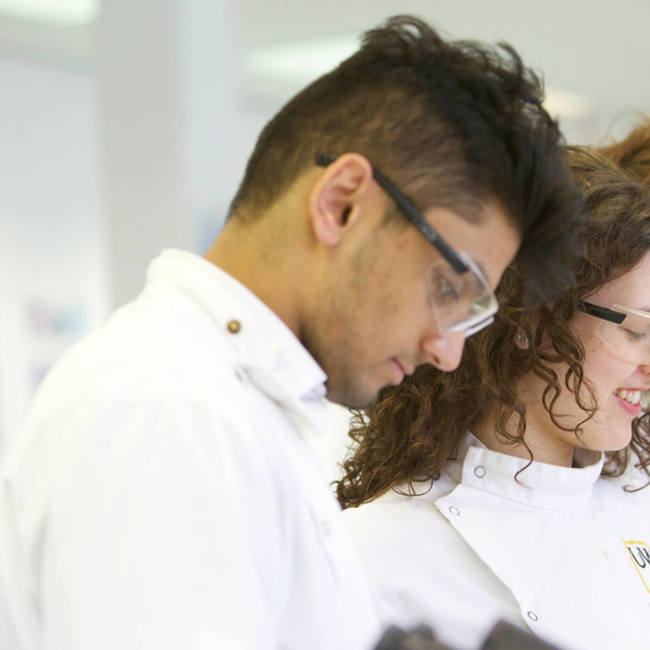Applied Bioscience with Forensic Investigation
Award
BSc (Hons)
Duration & study mode
4 years full-time
School
Health & Life Sciences
Location
Lanarkshire
Ucas code
C7F4
Course starting dates
-
Lanarkshire: September

Don’t worry if you missed the UCAS deadline, UWS is still open for 2026 applications!
Join us at a Summer Open Day, book a campus visit, or sign up for an online event to find out more.

Get ready to pursue a career in the biological or forensic sciences with UWS’s BSc Applied Bioscience with Forensic Investigation.
This degree will equip you with the forensic analysis skills to assess crime scenes and analyse biological and chemical evidence. It will also develop your complex problem solving skills.
Large amounts of practical work, experience with modern techniques and developing research and problem-solving skills are key strengths of the programme as is the option to undertake a work placement in year 3.
It is focussed on producing well-qualified, highly skilled graduates who meet the demands of the UK and international biotechnology, food, pharmaceutical, life sciences and forensic sectors.


This degree has been accredited by the Royal Society of Biology (RSB) following an independent and rigorous assessment.
Accredited degrees contain a solid academic foundation in biological knowledge and key skills, and prepare graduates to address the needs of employers. The accreditation criteria require evidence that graduates from accredited degrees meet defined sets of learning outcomes, including subject knowledge, technical ability and transferable skills.
This course meets, in part, the academic and experience requirement for the Membership of the RSB and Chartered Biologist (CBiol) status.
The Royal Society of Biology is the leading professional body for the biological sciences in the United Kingdom. The Society represents over 18,000 biologists from all areas of the life sciences, as well as over 100 organisations which make up the diverse landscape of biology in the UK and overseas. The Royal Society of Biology offers members unique opportunities to engage with the life sciences and share their passion for biology.
We welcome Scottish, UK and international students and consider all applicants on an individual basis.
If you are applying with an EU or non-EU qualification, please check our Undergraduate Entry Requirements page which gives more information about country-specific entry requirements.
Direct entry into year 2 and 3 is possible.
All academic degrees/awards at UWS are taught in English. For applicants whose first language is not English*, the University sets a minimum English language proficiency level. All English language qualifications must have been gained within two years of the start of your UWS course.
* applicants who are exempt from English language requirements include:
In general terms, if you are applying to study a course at, or above, Year 1 (SCQF Level 7) bachelor’s degree level, then the UKVI’s minimum level of English proficiency is Common European Framework for References of Languages (CEFR) at B2 (Upper Intermediate).
At UWS, we define our general English language requirements using the International English Language Testing System (IELTS) Academic module (not General Training) as follows:
These are minimum requirements and some courses may require a higher standard for admission†.
† Exceptions to this level of IELTS scoring exist for some accredited or professionally-recognised courses (see IELTS Score Exceptions section below for more information).
For our research degrees (MRes, MPhil, PhD, DBA, DProf) applicants are required to have an IELTS score as follows:
For Midwifery courses that lead to professional registration with the Nursing & Midwifery Council (BSc Midwifery), applicants are required to have an IELTS score as follows:
Our BSc Paramedic Science degree leads to professional registration with the Health and Care Professions Council (HCPC); it has different IELTS requirements than other Health-related courses. Although it is not possible to apply for this degree directly as an international student, for applicants who meet SAAS residency requirements and for whom English is not their first language, then the following IELTS scores are required:
For our BSc (Hons) Biomedical Science and MSc Advanced Biomedical Science degrees, which may lead to professional registration with the Health and Care Professions Council (HCPC), applicants are required to have an IELTS score as follows:
Our BA (Hons) Social Work and MSc Social Work degrees are professionally recognised by the Scottish Social Services Council and applicants are required to have an IELTS score as follows:
For our Certificate of Higher Education courses, applicants are required to have an IELTS score as follows:
In additional to IELTS, we also accept a number of alternative English language for application and admission to our courses for both home/EU and international students at bachelor's degree study at Year 3 (SCQF Level 9), and above. From Cambridge to TOFEL iBT qualifications the number of these qualifications is extensive.
Find out about non-IELTS English Language Tests
UWS has also reviewed a range of High / Secondary School qualifications studied by non-EU applicants that can be used as a basis of entry to a UWS. These range from Botswana GCSEs to USA High School Graduation Diplomas, the number of these qualifications is extensive.
Find out more about international English Language high-hchool qualifications
Applicants who do not meet the minimum English language requirements have the option to study one of our preparatory and pre-sessional English courses. The UWS courses available are:
“The opportunities I’ve had here have been brilliant. I’ve gained multiple new skills and knowledge in different fields.”
Franklin Babu, BSc (Hons) Applied Bioscience with Forensic Investigation graduate (NUS International Student of the Year Runner-up 2017)
You’ll be given the option to undertake a 12-week placement during Year 3 of this programme, allowing you to apply the skills, techniques and knowledge you’ve gained to real-world settings.
This qualification is acceptable to all Schools of Education as an entry qualification to the Postgraduate Diploma in Education for Biology and General Science teaching.
A general introduction to various biological disciplines, from cell and molecular aspects to ecological and environmental topics. You will be introduced to the role of a forensic scientist and research specific cases. All first-year students are given an introduction to the UWS Virtual Learning Environment.
Studies include how to identify, collect and analyse biological trace evidence from a crime scene. You will acquire expertise in the use and application of microscopy in a forensic investigation. Subjects including molecular genetics, biochemistry, pharmacology and microbiology will be introduced.
You will study DNA and controlled substances and will apply your knowledge to investigate a crime scene scenario. You may have some choice in which bioscience to focus on e.g. microbiology, immunology or biochemistry. A valuable career enhancing 12-week work placement is possible in a research, hospital or company laboratory.
You will study forensic specialist subjects taking you from the crime scene to the courtroom while gaining in-depth knowledge of your chosen biological subjects and their applications. A critical part of the Year 4 curriculum is a supervised project where you participate in research in a subject area of your choice.
You will be taught through a combination of lectures, tutorials and workshops.
You will also have the opportunity to take part in group work and independent learning to develop your transferable skills such as research, presentation, communication and working as part of a team.
This degree is assessed using a variety of assessment methods including:
Programme Specification and Module Descriptors for Undergraduate and Postgraduate courses are available to download (PDFs). These provide you with core information concerning your chosen subject.
Graduates enjoy careers in healthcare, pharmaceutical, biotechnology and environmental management industries, where roles include microbiologists, molecular scientists and analytical chemists. Postgraduate opportunities in research, teaching or other full-time courses may be available.
Some graduates choose further study including MSc Advanced Biomedical Science or MSc Biotechnology. Options to study biosciences at PhD level are also available.
£1,820 cost per year of study (usually paid by the Scottish Government via SAAS*)
£9,535 per year of study (4 years of study for the price of 3 years)
£9,535 per year of study (4 years of study for the price of 3 years)
£15,500 per year of study
£305 per module (20 credits)
£1,590 per module (20 credits)
£1,590 per module (20 credits)
£2,580 per module (20 credits)
£1,820 cost per year of study (usually paid by the Scottish Government via SAAS*)
£9,535 per year of study (4 years of study for the price of 3 years)
£9,535 per year of study (4 years of study for the price of 3 years)
£16,275 per year of study
£305 per module (20 credits)
£1,590 per module (20 credits)
£1,590 per module (20 credits)
£2,710 per module (20 credits)
Estimated cost per year of study.
Ready to apply? All UK & EU Undergraduate applications should be made through UCAS. Further information for international, part-time and exchange applications can be found below
Apply via UCASAll UK and EU applicants for undergraduate study, not applying through an agent or partner, should apply through UCAS (Universities and Colleges Admissions Service).
Please refer to our Undergraduate Application Guide for domestic & EU/EEA to find more information on when and how to apply to study at UWS. You can find out more about applying for this undergraduate course on UCAS.
Students from non-EU/non-EEA countries can apply directly to UWS via our dedicated online application system. The latest we can process your application is 6 weeks before the course start date to allow for visa processing times. For more information on when and how to apply to study at UWS please refer to our International Undergraduate Application Guide.
For part-time & online study, you should apply directly to the University through our online application system, not through UCAS. Please select the part-time mode of study when submitting your application. Before you begin your application, it is important to read the part-time application step-by-step guide for a smooth process.
To come to UWS as a visiting student on a study abroad or exchange programme, you must apply entirely through our online system.
An ATAS certificate is not required for overseas students applying for this course.
UK students
Our enquiry team is here to help: ask@uws.ac.uk
International students
Contact our dedicated international team: international@uws.ac.uk
We will always try to make sure that we publish accurate course information but we do not accept responsibility for any mistakes or omissions. We will also try to make sure that we deliver our courses in line with our published information. However, we may not always be able to do so and you can find further information about this in our enrolment terms and conditions.
